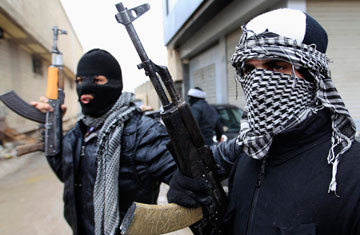
Syrian soldiers, who have defected to join the Free Syrian Army, hold up their rifles as they secure a street in a suburb of Damascus on Jan. 27, 2012
(3 of 3)
"If I see one of those men in the national council after the revolution strut in and try to claim a role, I swear I will kill him," Jihad says.
Abu Hikmat's telephone rings. He was a trader in Jisr al-Shughour before the death of his brother at a checkpoint outside the city turned him into a revolutionary. "How many phones?" he asks the caller. "Fifteen? I want 50. Get me 50. He was supposed to get us 150; if he can't, we don't want to work with him."
The discussion in the room continues despite the fact that Abu Hikmat's phone rings at least four times in the next half an hour. He is busy organizing supplies of 9-volt batteries, and phones.
"I have three ships full of Libyan weapons, but I can't get even a Kalashnikov to you," the doctor says, "because [Turkish Prime Minister Recep Tayyip] Erdogan won't let them in. We've talked to [other Arab leaders TIME was asked not to identify], but it's hard."
Omar quietly takes his leave from the group, does his ablutions and returns to pray in a corner of the room. He faces Mecca, his back to the circle of men.
"Brothers, nobody is going to support you from outside," the doctor says.
"We won't go back, we have said, we will not stop until he is toppled!" Abu Hikmat says, getting agitated. "So what can we do? What about a no-fly zone?"
"It's not going to happen, get it out of your heads," the doctor says.
"Doctor, we say 'Allahu Akbar!' and we intend to liberate our land from Assad's forces!" Abu Hikmat says, his voice rising with his emotion.
The doctor remains calm. He takes a puff from his pipe. "How? I want a plan."
The discussion turns to an improvised explosives device that was tested that morning and failed to detonate. "We have to explode something that will take them a month and a half to repair," Jihad says.
Omar, who has rejoined the group, says any potential target must take "more than two hours to fix," casting a questioning glance at Abu Hikmat.
"I'm working within my means," Abu Hikmat says defensively. They debate targets and where to place the explosives. They will seize military trucks ferrying supplies to troops, confiscate their cargo and block roads with the burnt vehicles, they decide. They will cut off army supply routes and overrun checkpoints.
"Inshallah, you will hear good news soon," the captain tells the doctor.
"I know what our officers have studied. With all due respect," the doctor says turning to the defectors, "don't expect too much from our loyalist soldiers. Our officers study army-to-army combat, not this. The presence of a high-ranking officer doesn't necessarily mean he knows more than you do. You need an explosives expert."
The captain points to his deputy, Sergeant Ahmad, an explosives engineer.
"We chose the captain to lead us because he is one of us," Jihad says. "He understands us."
"Stop it, you're embarrassing me," the captain says as the men all laugh.
"The captain is successful and respected because he took off his uniform and is with you," the doctor says. "Riad al-Asaad gives speeches and wears his uniform. He isn't here with you."
The captain's phone rings, but the discussion continues. "What? Nail bombs? How many dead?" he says. (The captain later explains that the regime is using nail bombs in residential areas, a claim that, like so many in the war in Syria, is difficult to verify.) The toll is low, one man, but the men in the room all knew him. A few offer a "may God rest his soul."
"Doctor, if this continues for another three months, we will have something worse than al-Qaeda to deal with. The drunks, the womanizers, they're not only devout now, they're becoming extremists," the captain says. "Won't that scare Western capitals into helping us?"
"Europe is about interests, that's it," the doctor says. "They worked with [Libyan revolutionary Abdelhakim] Belhadj, I know him and he is practically al-Qaeda, they don't care. They just want somebody organized to deal with."
The talk turns to Afghanistan and how the West armed and supported mujahedin fighters against the Soviets before the doctor wrests it back to the present. "Now, what will benefit us is to establish an operations room. Let's work on that," he says.
"Doctor, your words are golden," Abu Hikmat says. He's calmed down. "We must unite and have an operations room. We, the revolutionaries of Jisr al-Shughour, are united," he says, gesturing around the room. "As well as in Idlib. You have boosted our morale and given us knowledge."
The doctor gets up to leave. He hugs and kisses each man. "I hope to see you again soon," he tells Abu Hikmat. "I hope so too," Abu Hikmat replies. "But these days, who knows? Death may come sooner."
